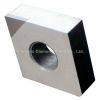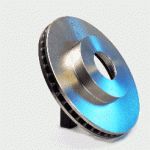CBN




Diamond, cubic carbon, is the hardest, most abrasive resistant material known to man. It is therefore an ideal tool material. Unfortunately, in the presence of heat and iron, nickel or cobalt, diamond transforms to hexagonal form, graphite. This is why ferrous materials are not generally machined with diamond.
The second hardest man-made material, is Cubic Boron Nitride (CBN). CBN is created using temperatures and pressures similar to those for diamond synthesis, but does not have this inherent weakness when it comes to the machining of ferrous materials. Used in the correct manner CBN offers cost-effective
rapid stock removal and finishing of hardened steels and certain softer ferrous materials.
CBN can provide a cost effective and highly productive alternative to hard metal or ceramic cutting tools for the machining of cast irons.
In general terms, the following factors should be considered when applying CBN to an ironcomponent. Cast iron is not generally very hard (less than HRc.30) but tends to be abrasive. CBN is therefore employed because of its abrasive resistance. Unless the iron has been chilled or deliberately heat treated, the cutting action will be such that the PCBN will not be required to anneal the material being cut in the shear zone. Grey cast irons are often fully pearlitic in structure - Grade 14 & 17 are common.
In this case, the best results are gained using DR - 100/85 at surface speeds above 400 m/min. if the machine tool or component limit the speed available to less than 400 m/min, DR - 50 becomes more cost effective. Tool life and component quality improvements are often dramatic and more than justify the increased cost of the PCBN tools. if the grey cast iron is not fully pearlitic and more free ferrite is present within the structure, the machinability of the iron becomes more difficult to predict. As the level of soft and sticky ferrite increases, the tool is more likely to suffer adhesion pick up which will alter the cutting action, resulting in premature wear of the tool.
DR-50 becomes more likely to provide good results as the level of free ferrite increases and a short trial will
soon determine the most suitable CBN material.
Fully ferritic grey cast irons are not generally cost effective CBN applications. S.G. irons are usually soft (less than HRc.30) and fully ferritic. CBN is therefore not often as efficient as other cutting tooltool materials.
There has, however, been a tendency to produce S.G. irons (nodular irons) with a pearlitic structure.This has
resulted in some nominally S.G. irons machining surprisingly well with CBN, DR-50 tending to be more successful.
Low alloy irons commonly used in the automotive industry can be machined with CBN, but the performance is again dependent on the level of free ferrite in the structure.
Hardened irons, either heat treated or alloyed and heat treated, are machined in the same manner as hardened steels and are therefore more predictable. Cutting speeds recommended are lower - less than 200 m/min.
It must be remembered that cast iron of a given specification produced by a foundry on one day may have a different machinabilty to that produced the next day.
Once the benefits of machining with CBN have been determined, it may be considered worthwhile ensuring that castings supplied to the machine shop have a suitable microstructure to guarantee consistent CBN tool performance.
If the structure or grade of cast iron is unknown, a simple trial will soon determine the suitability of CBN as a cutting tool.
For all your CBN cutting tool needs, call Dikar Tool TODAY at (248) 348-0010
or email our Sales Manager, Bob Forsyth Email to: bforsyth@dikartool.com
